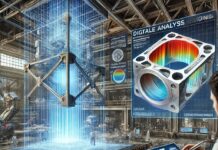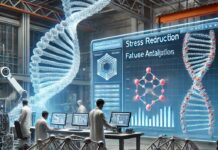Mechanical Engineer Misagh Daraei chatted with #Powerjournalist Markos Papadatos about maximizing efficiency.
General Research and Expertise
What inspired you to focus on efficiency and optimization in mechanical engineering?
From an early stage in my career, I was drawn to the idea of maximizing performance while minimizing waste. Efficiency and optimization are at the heart of modern engineering, enabling us to create more sustainable, cost-effective, and high-performing systems. The challenge of refining mechanical systems to operate at their peak performance has always fascinated me.
What are the key challenges in improving efficiency in modern mechanical systems?
One of the biggest challenges is balancing efficiency with other factors such as cost, manufacturability, and sustainability. Many modern mechanical systems have already been optimized to a high degree, so achieving further improvements often requires innovative materials, advanced computational modeling, and interdisciplinary approaches. Additionally, regulatory and environmental constraints add complexity to the optimization process.
How do you approach optimization in engineering design, and what methodologies do you find most effective?
My approach typically involves a combination of computational simulations, experimental validation, and data-driven modeling. Methods like finite element analysis (FEA), computational fluid dynamics (CFD), and multi-objective optimization algorithms help refine designs. I also integrate AI and machine learning techniques to identify patterns and predict optimal solutions.
Current and Past Research
Can you share details about your most recent research project?
My recent work focuses on optimizing energy efficiency in mechanical systems, particularly in thermal management and aerodynamics. By leveraging AI-driven simulations and real-world testing, we have developed strategies to reduce energy loss in high-performance machinery.
Have you developed any innovative techniques or models that significantly improve efficiency?
Yes, one of my contributions includes an AI-assisted predictive modeling framework that improves the efficiency of rotating machinery by identifying optimal operating conditions. This model has been tested in various industrial applications, yielding measurable energy savings.
How do your findings contribute to advancements in mechanical engineering?
My research provides practical methodologies for industries looking to enhance their system performance. By integrating AI with traditional optimization techniques, engineers can make more informed decisions, reduce prototyping costs, and achieve higher efficiency levels in real-world applications.
Have you worked on any real-world applications where your research had a significant impact?
Yes, I have collaborated with industries in the energy and aerospace sectors to optimize turbine efficiency and reduce aerodynamic drag. These improvements have led to tangible cost savings and increased system longevity.
Industry Applications and Trends
How do your optimization techniques apply to industries like automotive, aerospace, or energy?
In the automotive industry, my work helps improve fuel efficiency and aerodynamics. In aerospace, optimization techniques enhance aircraft performance and reduce drag. In energy, particularly renewables, optimization plays a crucial role in improving wind turbine efficiency and thermal energy management.
What role does artificial intelligence or machine learning play in mechanical optimization?
AI and ML are transforming mechanical engineering by enabling predictive maintenance, real-time system optimization, and automated design improvements. These technologies allow us to analyze vast datasets, detect inefficiencies, and implement self-optimizing systems.
What are the biggest inefficiencies in engineering today, and how can they be addressed?
The biggest inefficiencies stem from outdated designs, material limitations, and suboptimal system integrations. Addressing these requires a shift toward smart materials, AI-driven optimizations, and improved manufacturing techniques, such as additive manufacturing (3D printing), to reduce waste and enhance performance.
Future Outlook
Where do you see the field of efficiency and optimization heading in the next decade?
I see a strong movement toward autonomous optimization systems that use AI and IoT (Internet of Things) to self-regulate and improve performance in real time. Additionally, advancements in quantum computing could revolutionize optimization capabilities in ways we can barely imagine today.
Are there any emerging technologies that excite you in terms of their potential for optimization?
Yes, digital twins—virtual replicas of physical systems—are revolutionizing how we test and refine mechanical designs. Additionally, meta-materials and AI-driven simulations are opening new frontiers in performance optimization.
What advice would you give to engineers looking to improve efficiency in their designs?
Always take a holistic approach—optimization is not just about one component but the entire system. Leverage data-driven tools, be open to interdisciplinary learning, and embrace emerging technologies like AI and automation to push the boundaries of efficiency.
Personal Perspective
What does success mean to you?
Success, to me, is the ability to create meaningful impact—whether it’s through advancing engineering knowledge, solving complex problems, or mentoring the next generation of engineers. Seeing my work contribute to real-world efficiency improvements and sustainability is the most fulfilling aspect of my career.







